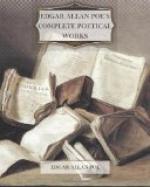“You are aware of the great barrier in the path of an American writer. He is read, if at all, in preference to the combined and established wit of the world. I say established; for it is with literature as with law or empire—an established name is an estate in tenure, or a throne in possession. Besides, one might suppose that books, like their authors, improve by travel—their having crossed the sea is, with us, so great a distinction. Our antiquaries abandon time for distance; our very fops glance from the binding to the bottom of the title-page, where the mystic characters which spell London, Paris, or Genoa, are precisely so many letters of recommendation.
“I mentioned just now a vulgar error as regards criticism. I think the notion that no poet can form a correct estimate of his own writings is another. I remarked before that in proportion to the poetical talent would be the justice of a critique upon poetry. Therefore a bad poet would, I grant, make a false critique, and his self-love would infallibly bias his little judgment in his favor; but a poet, who is indeed a poet, could not, I think, fail of making a just critique; whatever should be deducted on the score of self-love might be replaced on account of his intimate acquaintance with the subject; in short, we have more instances of false criticism than of just where one’s own writings are the test, simply because we have more bad poets than good. There are, of course, many objections to what I say: Milton is a great example of the contrary; but his opinion with respect to the ’Paradise Regained’ is by no means fairly ascertained. By what trivial circumstances men are often led to assert what they do not really believe! Perhaps an inadvertent word has descended to posterity. But, in fact, the ‘Paradise Regained’ is little, if at all, inferior to the ‘Paradise Lost,’ and is only supposed so to be because men do not like epics, whatever they may say to the contrary, and reading those of Milton in their natural order, are too much wearied with the first to derive any pleasure from the second.




